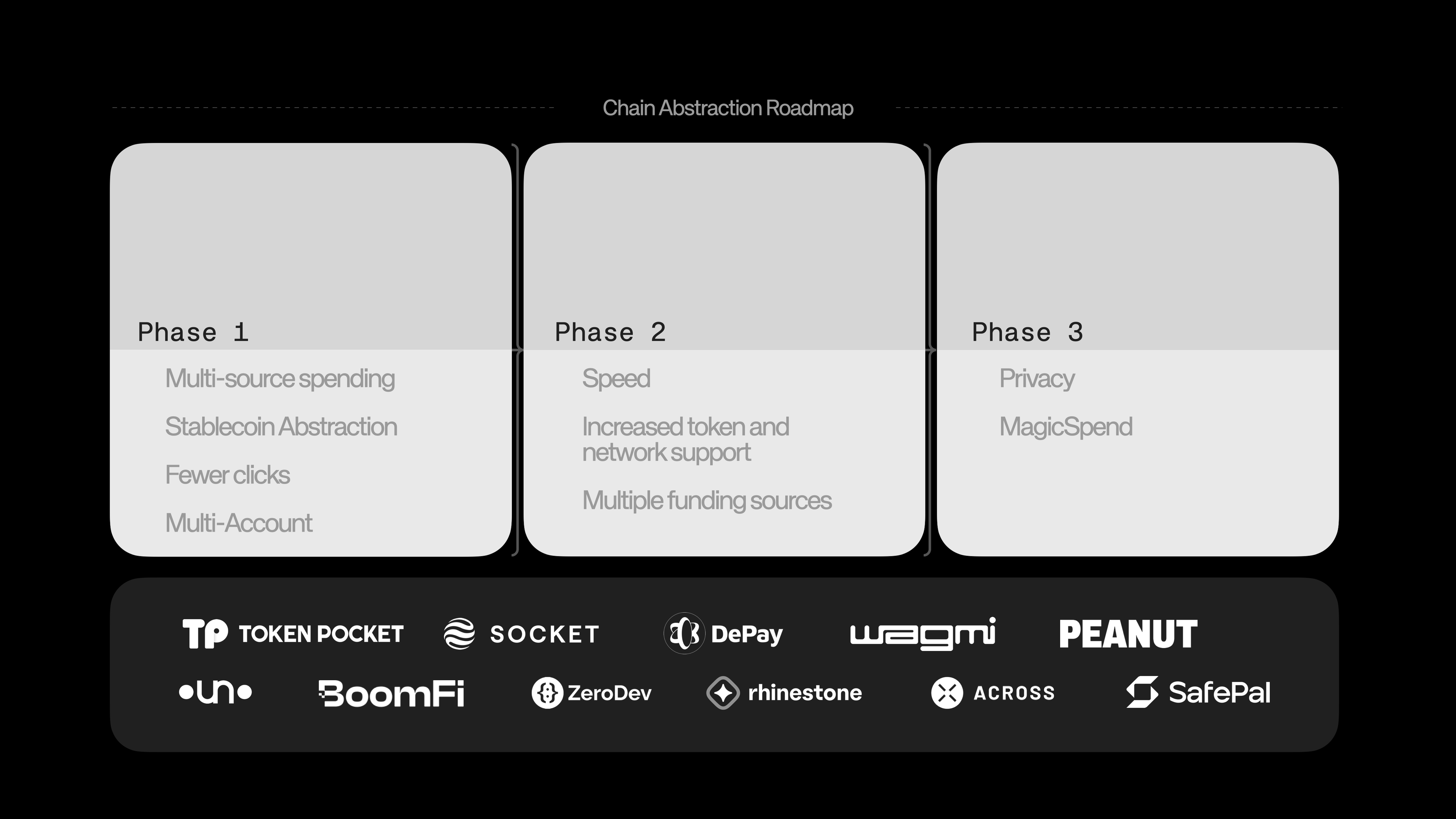Enhancing Cross-Chain Interactions: Reown’s Phased Approach to Chain & Token Abstraction

Before scaling and Layer 2 solutions and recent onchain innovations, those who joined the crypto space faced considerable user experience challenges. Over the past few years, new infrastructure and rising developments like L2s enabled web3 developers to make a significant portion of those challenges – like high gas fees, costly transactions, painful user onboarding, seed phrases, and high latency – near obsolete. Though these advancements have undoubtedly improved onchain UX in areas critical to the adoption, they have also brought their own subset of challenges.
Imagine a new user entering the crypto space and trying to transact with a decentralized app. Thanks to solutions like Layer 2s, they soon discover that each app they interact with sits on a specific chain, requiring them to hold that chain’s native tokens in their wallet to proceed with transactions. As they move to another app, they again need to hold a new set of tokens to interact. With multiple popular Layer 2 and non-EVM solutions used today, users are often left with wallets full of tokens fragmented across numerous chains – unused and somewhat unusable elsewhere. Much like requiring different bank accounts each time you visit a different physical store, this approach is unsustainable and unnecessarily complex, ultimately stifling the industry’s potential to grow. On top of that we are witnessing a similar proliferation of different stablecoins, further pushing users to have to have a different currency ready per store.
With the upcoming rollout of new standards – like EIP-7702 – in Ethereum’s 2025 ‘Pectra’ upgrade, these problems are expected to improve as these standards will enable more cross-chain compatibility, allowing users to transact seamlessly without needing multiple native tokens for each interaction. However asset fragmentation as a whole, across both L2s and non-EVM chains, will still require significant work to establish a future where onchain technology is usable. Cross-chain interactions simply must be easier – functional, practical, and intuitive – for onchain UX to scale, and at Reown we’re working to achieve just that.
Reown’s Phased Approach to Chain & Token Abstraction
Reown is taking a phased approach to creating a seamless user experience for cross-chain interactions, and already has several partners onboard – spanning Socket, TokenPocket, Wagmi, ZeroDev and more – who will help to both drive this new innovation, and also facilitate its functionality across different use cases. This strategy allows Reown to implement and refine solutions to meet evolving user and ecosystem needs. Phase 1 focuses on establishing essential infrastructure to address core cross-chain challenges, laying the groundwork for solutions to asset fragmentation, gas token management, and cross-chain transactions.
In subsequent phases, Reown will continue to improve the user experience by reducing latency, enhancing transaction speeds, and simplifying cross-chain operations. Each phase progressively builds on the last to ensure a scalable, frictionless experience as the ecosystem grows in complexity.

Phase 1: Multi-Bridge and Multi-Swap Solution
In Phase 1, Reown will introduce multi-bridge and multi-swap solutions to tackle key issues in cross-chain transactions and asset fragmentation. This phase integrates with proven infrastructure like Socket and Across, focusing on setting new standards for interoperability between decentralized applications and wallets. By building on existing bridge and swap infrastructure, Reown enhances the user experience without overhauling existing tech.
Reown is co-authoring ERC-7811, a new standard designed for apps to be able to determine the spending power the user owns across networks. This standard will later become a CAIP to make it chain agnostic. The Reown Wallet SDK, WalletKit, available for platforms including Flutter, Swift, Kotlin, React Native, web, and Unity, will provide a simple API and sample UI for easy multi-bridge and multi-swap integration. Depending on the use case, applications onboarding onto chain abstraction will also need to disclose their ABI to ensure the SDK can decode transactions and calculate necessary assets for bridging or swapping.
This phase also supports broader goals like clear signing and Smart Sessions. The aim is to ease asset fragmentation by allowing users to leverage assets across networks in cross-chain transactions. Though Phase 1 will not provide instant speeds, it addresses key issues and sets a foundation for future improvements. Initial support is expected by Q4 2024, with a rollout to top wallets and apps by Q1 2025.
For an end user, with a wallet supporting Reown’s Phase 1, multi-bridge and multi-swap solutions, cross-chain interactions will feel more unified and streamlined. Instead of holding specific tokens for every network, users can interact with multiple chains from a single wallet. The wallet automatically handles asset bridging and swapping in the background, reducing friction in cross-chain transactions. Additionally, improved transaction prompts provide clear details, enhancing transparency and security. With support for Smart Sessions, users can stay connected across dApps without repeatedly reauthenticating, creating a smoother, more cohesive experience.
For users, this means an instant improvement when interacting across different chains with a more unified, streamlined, and intuitive flow. Instead of holding specific tokens for every network, users can interact with multiple chains within a single process in their wallet. The wallet automatically handles asset bridging and swapping in the background, reducing friction and improving overall latency. Additionally, improved transaction prompts provide clear details, enhancing transparency and security. With support for Smart Sessions, users can stay connected across apps without repeatedly reauthenticating, contributing towards an all-around radically fresh approach to using onchain products.
Phase 2: EIP-7702, Session Keys, and Resource Locks
Phase 2 builds on Phase 1, focusing on improving user experience and reducing latency. By introducing standards like EIP-7702 and Session Keys, this phase will make cross-chain interactions faster and more user-friendly.
Technical Enhancements in Phase 2:
- Session Keys: Allow users to complete multi-bridge transactions without needing to reopen wallets repeatedly, thus reducing perceived latency.
- Resource Locks: Provide a mechanism that optimistically locks users' funds, giving fillers confidence to fill transactions on the target chain without waiting for source chain finality.
- Future Standards: Expansion of supported tokens and networks, with standards like xERC20 offering more flexibility.
Phase 2 is set to begin rolling out in Q2 2025, with improvements in transaction speeds and user experience as more dapps and wallets adopt these standards. This phase is a pivotal step toward faster, more efficient cross-chain interactions and prepares the groundwork for future innovations such as private transactions and expanded asset abstraction.
Beyond Phase 2: Expanding Funding Sources and Privacy Modules
Beyond Phase 2, Reown plans to expand funding sources to include custodial accounts like Venmo balances, made possible through a modular framework allowing easy integration by custodial providers. This expansion will enable users to access funds from diverse sources, enhancing their flexibility.
Additionally, Reown is exploring on-demand token swaps, allowing users to swap any token to fund transactions. There is also an opportunity to add an element of privacy to transactions: Fillers could fund the transaction on the target chain but draw the funds from the user in increments, making it harder to trace. This approach could provide web2-like privacy where a party you interact with knows the transaction you made but it is not public to the entire world.
The Vision for Reown’s Phased Solution
Reown’s phased approach ultimately aims to create a seamless, cross-chain experience that empowers users with the flexibility, efficiency, and ease of traditional finance—while preserving the decentralized principles at crypto’s core. By addressing the immediate barriers to cross-chain interaction and setting up foundational standards, each phase brings us closer to a unified and scalable ecosystem where users can interact across networks as easily as within a single chain.
At the end of this journey, Reown envisions a solution where asset fragmentation, gas token complexities, and latency are things of the past, and users can experience unified, intuitive routes to interact onchain:
- Effortless Cross-Chain Interactions: Users will be able to seamlessly transact across networks without needing to manage multiple wallets, tokens, or network-specific processes. Assets, whether held on EVM or non-EVM chains, will be instantly accessible and usable.
- Customizable Privacy and Control: With privacy modules and token abstraction, users will have greater control over their data and financial transactions, with the option to keep certain assets or activities private.
- Expanded Funding Sources: Users will not be limited to decentralized assets; custodial and traditional accounts will integrate smoothly, allowing funds to flow in and out of the ecosystem without friction.
- Enhanced Transaction Efficiency: Building on solutions like EIP-7702 and Session Keys, Reown will offer nearly instantaneous cross-chain interactions, making decentralized finance as responsive and efficient as centralized options.
By providing a robust, user-centric foundation through its phased approach, Reown is crafting a solution that’s not just a product, but a transformative platform. This solution aims to bridge today’s technical gaps in a way that scales with the ecosystem, making decentralized applications truly accessible to the next generation of crypto users.
Reown’s phased approach to chain abstraction addresses the critical challenges of cross-chain interactions, asset fragmentation, and user experience in the decentralized ecosystem. Phase 1 introduces a multi-bridge and multi-swap solution that leverages proven infrastructure and establishes new interoperability standards. Phase 2 builds on this foundation with enhanced transaction efficiency, reduced latency, and session keys for a smoother user experience. Beyond Phase 2, Reown aims to expand funding options and implement privacy modules, ensuring a secure and user-friendly experience.
By methodically addressing these challenges, Reown is paving the way for a more accessible and efficient decentralized ecosystem, empowering users and making decentralized applications more adaptable to future growth.


